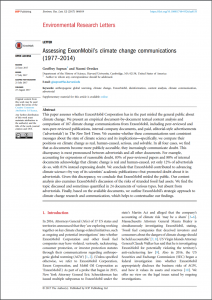Full Title: Assessing ExxonMobil’s climate change communications (1977–2014)
Author(s): Geoffrey Supran and Naomi Oreskes
Publisher(s): IOPscience
Publication Date: August 1, 2017
Full Text: Download Resource
Description (excerpt):
This paper assesses whether ExxonMobil Corporation has in the past misled the general public about climate change. We present an empirical document-by-document textual content analysis and comparison of 187 climate change communications from ExxonMobil, including peer-reviewed and non-peer-reviewed publications, internal company documents, and paid, editorial-style advertisements (‘advertorials’) in The New York Times. We examine whether these communications sent consistent messages about the state of climate science and its implications—specifically, we compare their positions on climate change as real, human-caused, serious, and solvable. In all four cases, we find that as documents become more publicly accessible, they increasingly communicate doubt. This discrepancy is most pronounced between advertorials and all other documents. For example, accounting for expressions of reasonable doubt, 83% of peer-reviewed papers and 80% of internal documents acknowledge that climate change is real and human-caused, yet only 12% of advertorials do so, with 81% instead expressing doubt. We conclude that ExxonMobil contributed to advancing climate science—by way of its scientists’ academic publications—but promoted doubt about it in advertorials. Given this discrepancy, we conclude that ExxonMobil misled the public. Our content analysis also examines ExxonMobil’s discussion of the risks of stranded fossil fuel assets. We find the topic discussed and sometimes quantified in 24 documents of various types, but absent from advertorials. Finally, based on the available documents, we outline ExxonMobil’s strategic approach to climate change research and communication, which helps to contextualize our findings
